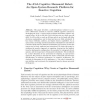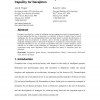21 search results - page 3 / 5 » Theory of Mind for a Humanoid Robot |
TROB
2008
14 years 11 months ago
2008
We present a system for robust robot skill acquisition from kinesthetic demonstrations. This system allows a robot to learn a simple goal-directed gesture, and correctly reproduce...
ICRA
2009
IEEE
15 years 6 months ago
2009
IEEE
Abstract—We present a motion planning algorithm that computes rough trajectories used by a contact-points planner as a guide to grow its search graph. We adapt collision-free mot...
ICRA
2003
IEEE
15 years 5 months ago
2003
IEEE
— We present a framework for composing motor controllers into autonomous composite reactive behaviors for bipedal robots and autonomous, physically-simulated humanoids. A key con...
118
click to vote
AI50
2006
15 years 3 months ago
2006
Abstract. This paper describes a multi-disciplinary initiative to promote collaborative research in enactive artificial cognitive systems by developing the iCub : a open-systems 53...
IJSR
2011
14 years 6 months ago
2011
Deception is utilized by a variety of intelligent systems ranging from insects to human beings. It has been argued that the use of deception is an indicator of theory of mind [2] ...


